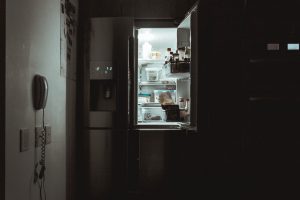The Answer to COVID Stress is not in the Fridge!
The Answer to COVID Stress is not in the Fridge!
Categories: WEEKLY DEVOTIONALS
The Answer to COVID Stress is not in the Fridge!

by Rhona Epstein, Psy.D., C.A.C.
Social media sites are flooded these days with jokes about eating and weight gain during this difficult season. Countless memes joke about joining AA or Weight Watchers at the end of quarantine, there are pictures of obese Barbie dolls labelled as the 2020 COVID doll, and people are posting about whether the producers of My 600 Pound Life will give them a call when this is all over. Even people who don’t usually struggle with overeating are finding themselves wandering in and out of the kitchen looking for a little something – or a lot. For problem eaters, this stay-at-home order can be a nightmare. Loneliness and isolation are often triggers for people who abuse food. Keeping busy, staying active, and having people around to help make life full are all ways people hope to help keep eating troubles at least somewhat in control. Structure is key for people in recovery from food abuse. When schedules are loose and the days all blend together, it’s easy for anyone to get sloppy about routines. Think about vacation – how many of us pull the plug and let ourselves go during those easy days of no work or schedule? For some people that’s part of the fun of being “off” – having no schedule, no routine.
To make matters more difficult, there are also emotional triggers for eating – the simplest of which is boredom. There’s the grief for all the people who are dying, for our culture, for the life we had. The uncertainty of the situation creates a great deal of unrest. People all around are frustrated, irritable and depressed. There is fear of getting COVID, or fear that someone we love will get it. Financial losses are cultivating agonizing concerns. There’s anxiety about the scarcity of food in the grocery stores. Some people try to manage without normal supplies, then become triggered to ration their food, and then binge on junk food after feeling deprived. This is how eating disorders develop. Of course, food is not fixing any of these emotional problems brought on by the COVID-19 crisis. It’s easy to use food for comfort, entertainment, stress relief, and escape. The problem is what happens on the other side of the comfort: guilt, shame, unwanted weight, mood disturbance.
Conversely, for those who are ready for change, having time to be at home with a slower pace and less temptations (fast food, parties, restaurants) can also be the opportunity of a lifetime to press into making progress. Online support groups are blowing up on Zoom and the telephone, offering accessibility literally day or night, and accountability is extremely important in making big changes. This is a great time to build new behaviors, such as planning healthy meals, detoxing from junk food, and creating a plan for a sustainably healthy way of eating. Starting an exercise routine is easier now as well. Online classes abound; the weather is getting better for brisk walks.
Above all, a slower pace grants us more time for seeking the Lord’s help and finding comfort in His loving presence – the ultimate solution to all of our cares. Our help is not in the refrigerator. But He provides help for every one of our concerns if we will put our trust in Him. The battle is real – but God’s power is available 24/7. He is a present help in times of trouble. May you find His strength in your weakness. Never give up!
 Rhona Epstein, Psy.D., is a licensed psychologist and marriage and family therapist in the Philadelphia area. She is the author of Food Triggers: End Your Cravings, Eat Well, and Live Better (Worthy Publishing) and Satisfied- A 90 Day Journey Toward Food Freedom (Dexterity Publishing). For more than thirty years, she’s led seminars, conferences, and therapeutic workshops to help people overcome food addiction and its underlying issues. She received her doctorate in clinical psychology from Chestnut Hill College, and her master’s degree in counseling psychology from Temple University. She’s passionate, from her own personal experience and recovery from food addiction, to address the needs of the whole person (mind, body, and spirit). Visit her web site at www.drrhona.com
Rhona Epstein, Psy.D., is a licensed psychologist and marriage and family therapist in the Philadelphia area. She is the author of Food Triggers: End Your Cravings, Eat Well, and Live Better (Worthy Publishing) and Satisfied- A 90 Day Journey Toward Food Freedom (Dexterity Publishing). For more than thirty years, she’s led seminars, conferences, and therapeutic workshops to help people overcome food addiction and its underlying issues. She received her doctorate in clinical psychology from Chestnut Hill College, and her master’s degree in counseling psychology from Temple University. She’s passionate, from her own personal experience and recovery from food addiction, to address the needs of the whole person (mind, body, and spirit). Visit her web site at www.drrhona.com
